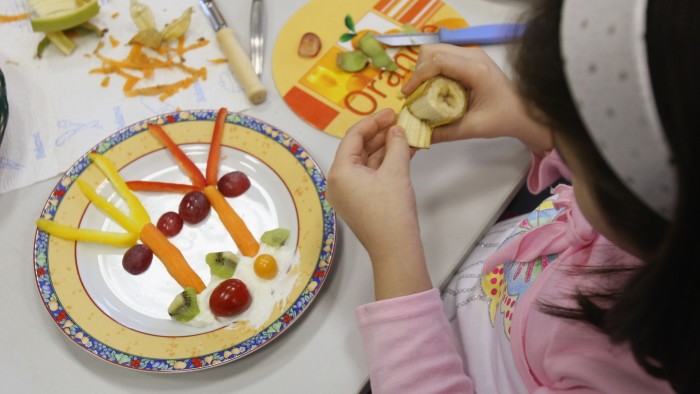Stay informed with free updates
Simply sign up to the Agriculture myFT Digest — delivered directly to your inbox.
Brussels will propose that fruit, vegetable and milk in schools should be “Made in Europe” as part of a wider push to favour domestic industries from defence to agriculture.
The European Commission will say on Wednesday that milk, fruit and vegetables bought through its schools scheme should be produced in Europe, in a signal to schools to buy more locally, according to a draft proposal seen by Financial Times. The scheme funds about €220mn worth of produce per year.
The “Made in Europe” clause reflects Brussels’ push for European institutions and companies to prioritise domestic goods over imports in an effort to boost the bloc’s flagging industry. The proposal comes as the commission prepares to make sweeping changes to agricultural funding as part of its next common budget, which it will also propose on Wednesday.
Brussels has recently introduced “Made in Europe” clauses into new defence procurement rules and state aid guidelines for clean technology — largely a result of a lobbying campaign led by France. It has also set domestic targets for the production of commodities such as critical raw materials.
The clause on schools — which also calls for produce from small producers and farms with a “low climate footprint” to be prioritised — will be part of a review of the bloc’s agricultural markets rules. The scheme is funded by the bloc’s common budget and will be maintained in the next EU spending plan running from 2028, according to the draft proposal.
“It’s nice for children to know this is an apple and this apple is from a tree 5km from me,” an EU official said.
While the EU is a net exporter of milk and dairy products, it imports roughly double the amount of fruit and vegetables that it exports. Its biggest suppliers are the US, Morocco and Turkey.
Seventeen member states already prioritise local or regional supplies, according to commission analysis of the current schools scheme.
The scheme will remain part of funding under the bloc’s Common Agricultural Policy, which is valued at €369bn and accounts for roughly a third of the EU joint budget.
Farmers have been adamant that financial support be maintained to ensure food security, despite competing priorities such as industry and defence.
The commission will propose that direct income support to farmers — worth about €291bn — be ringfenced, but that member states will have greater flexibility over support for additional needs such as training and funding for remote regions.
Payments to farmers will still be distributed according to the size of the farm but should be made according to a sliding scale that will benefit small farmers the most. Funding will be capped at €100,000 per farmer per year to better target support, according to a separate draft.
It will also stipulate for the first time that the EU funds can be used to pay for replacement workers should farmers need to take sickness or maternity leave, to encourage women to stay in the profession.
The commission declined to comment on the proposals.



